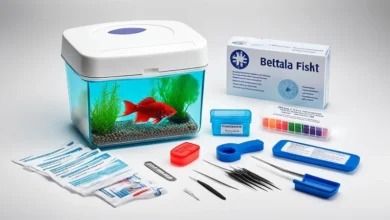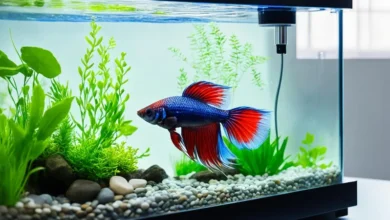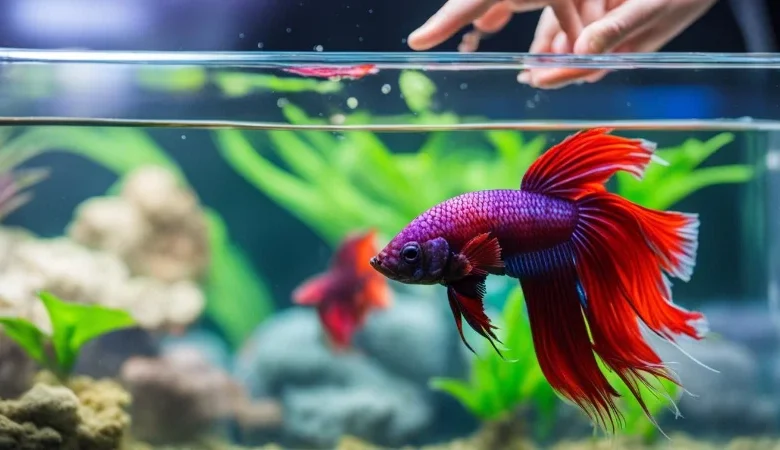
Do you own a betta fish and notice that it sometimes exhibits unusual behavior or appears stressed? If so, you’re not alone. Betta fish, or Siamese fighting fish, are popular pets due to their vibrant colors and unique personality. However, these beautiful creatures are susceptible to stress, which can negatively impact their overall health and well-being.
In this article, we will explore some common betta stress symptoms and provide tips on how to ease your fish’s anxiety. Understanding and addressing these signs of stress can help ensure that your betta fish thrives in a calm and peaceful environment. So, let’s dive in and discover how to create a stress-free haven for your finned friend.
Understanding Betta Stress Symptoms
Stress can have serious implications for the health and well-being of betta fish. It weakens their immune system, making them more susceptible to sickness and disease. Chronic stress can also lead to a shorter lifespan and a lower quality of life for betta fish. As responsible fish owners, it is crucial to provide a comfortable and safe environment for betta fish to reduce stress and promote their overall well-being.
To fully understand the impact of stress on betta fish, let’s delve deeper into its consequences and how it can affect these beautiful aquatic creatures.
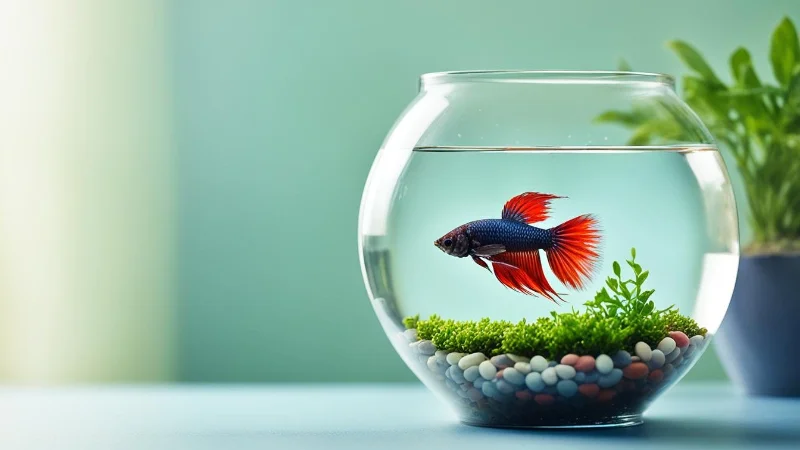
When betta fish experience stress, their immune system becomes compromised. This makes them more susceptible to bacterial and fungal infections, as well as parasitic infestations. In addition, stressed betta fish may exhibit changes in behavior, such as increased aggression or lethargy.
A stressed betta fish may also display physical symptoms like faded or dull coloration, clamped fins, and gasping for air at the water’s surface. These signs indicate that the fish is experiencing significant stress and requires immediate attention.
It is crucial for betta fish owners to understand the impact of stress on their fish. By recognizing the signs and taking appropriate action, owners can help alleviate stress and improve the overall health and well-being of their betta fish.
Creating a stress-free environment for betta fish involves providing proper tank conditions, including clean and adequately filtered water, suitable tank mates, and sufficient hiding spots. It is also essential to ensure that the lighting conditions are appropriate for the fish’s natural habitat.
Furthermore, a well-balanced diet that meets the nutritional needs of betta fish can help alleviate stress. Adding variety to their diet through a combination of high-quality pellets and live or frozen foods can provide essential nutrients and enrichment.
Why is addressing stress crucial for betta fish?
Betta fish live in small ecosystems where even the slightest stress can have severe consequences. By understanding stress and its impact, betta fish owners can take proactive measures to create a peaceful and healthy habitat, allowing their fish to thrive.
Causes of Stress in Betta Fish
Stress in betta fish can be triggered by various factors, all of which can impact their health and overall well-being. As responsible betta fish owners, it is crucial to understand these causes and take appropriate measures to minimize them. The following are some common stressors in betta fish:
- Low water quality: Poor water conditions, such as high levels of ammonia, nitrites, or nitrates, can cause stress in betta fish. It is essential to regularly monitor and maintain the water parameters to ensure a clean and healthy environment for your fish.
- Overcrowding: Keeping betta fish in a tank that is too small or overcrowded can lead to stress. Providing an adequate amount of space for each fish is crucial for their well-being.
- Inappropriate tank mates: Introducing aggressive tank mates or incompatible species can cause stress for betta fish. It is important to research and select appropriate tank mates to ensure a harmonious community tank.
- Poor diet: Feeding betta fish an unbalanced or improper diet can result in nutritional deficiencies and stress. Providing a varied and nutritious diet is essential for their overall health.
- Bright lights: Excessive exposure to bright lights can cause stress in betta fish. It is recommended to provide them with appropriate lighting and a dark period to mimic their natural environment.
- Sudden changes in the tank environment: Rapid changes in temperature, pH, or water parameters can stress betta fish. Gradually acclimating them to any changes and maintaining a stable environment is crucial.
- Lack of hiding spots: Betta fish are naturally curious and enjoy having hiding spots in their tanks. The absence of hiding spots can make them feel exposed and stressed. Providing caves, plants, or other structures for them to hide in is important.
- Inadequate stimulation: Betta fish require mental and physical stimulation to thrive. A lack of stimulation can lead to boredom and stress. Providing toys, tank decorations, and interactive activities can help keep them engaged and entertained.
- Injury or illness: Physical injury or underlying health issues can cause significant stress in betta fish. Regular health check-ups and prompt treatment of any injuries or illnesses are essential.
By understanding and addressing these causes of stress, betta fish owners can create a peaceful and stress-free environment for their aquatic companions, promoting their overall well-being and happiness.
Signs of A Stressed Betta Fish
As a betta fish owner, it is crucial to be able to recognize the signs and symptoms of stress in your fish. Identifying stress early on can help you take the necessary steps to alleviate it and improve the overall well-being of your betta fish.
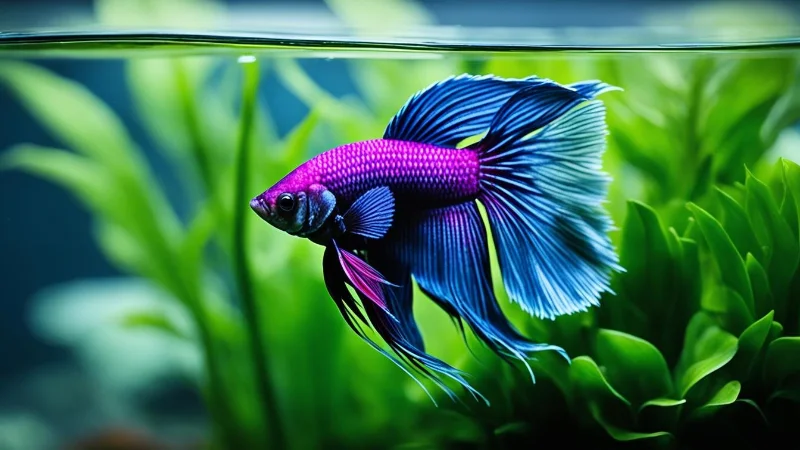
Common signs of a stressed betta fish
- Lethargy – If your betta fish appears inactive, spending most of its time hiding or not swimming around as much as usual, it may be a sign of stress.
- Lack of appetite – A stressed betta fish may refuse to eat or show a decrease in appetite. This can lead to weight loss and further health issues.
- Faded or dull coloration – Stress can cause betta fish to lose their vibrant colors, making them appear faded or dull.
- Clamped fins – When a betta fish is stressed, it may hold its fins close to its body, giving them a clamped appearance.
- Gasping for air – Stress can make betta fish breathe rapidly and appear as if they are gasping for air at the water’s surface.
- Jumping out of the water – In extreme cases of stress, betta fish may attempt to jump out of the tank to escape their environment.
- Rubbing against objects in the tank – If you notice your betta fish repeatedly rubbing against objects, it may be a sign of discomfort or irritation caused by stress.
By observing these signs, you can take appropriate measures to address the stressors and create a more peaceful and comfortable environment for your betta fish. Providing proper care, maintaining water quality, and minimizing stressors will help ensure the well-being of your aquatic pet.
FAQ
Why is my betta fish stressed?
Your betta fish might be stressed due to several factors, including sudden changes in its environment, poor water quality, inappropriate water temperature, lack of hiding spots, and the presence of aggressive tank mates. Additionally, overfeeding, underfeeding, or infrequent tank cleaning can contribute to stress.
What causes stress in a betta fish?
Stress in a betta fish can be caused by:
- Environmental changes: Rapid shifts in temperature, pH levels, or water hardness.
- Water quality: High levels of ammonia, nitrites, or nitrates in the tank.
- Overcrowding: Too many fish in the tank, leading to competition for resources.
- Inadequate space: Small tanks that limit swimming space.
- Lighting: Excessive or inconsistent lighting conditions.
- Aggressive tank mates: Other fish that bully or harass the betta.
How do I know if my betta is stressed?
You can identify stress in your betta fish by observing the following signs:
- Abnormal swimming patterns: Erratic swimming, darting, or lethargy.
- Color changes: Dull or faded colors.
- Loss of appetite: Refusing to eat or eating very little.
- Clamped fins: Fins held close to the body.
- Hiding: Spending excessive time hiding or resting at the bottom of the tank.
- Rapid gill movements: Increased respiration rate.
How to help a stressed betta fish?
To help a stressed betta fish, you can:
- Improve water quality: Perform regular water changes and monitor chemical levels.
- Maintain stable temperature: Keep the water temperature between 76-82°F (24-28°C) using a reliable heater.
- Provide hiding spots: Add plants, caves, or decorations to create hiding places.
- Avoid overfeeding: Feed small amounts of high-quality food and remove uneaten food.
- Reduce tank mates: If necessary, isolate the betta to reduce aggression from other fish.
How to calm a stressed betta fish?
To calm a stressed betta fish, you should:
- Create a consistent environment: Avoid sudden changes in water conditions or tank setup.
- Use a gentle filter: Ensure the filter doesn’t create strong currents that can stress the fish.
- Dim the lights: Use subdued lighting to create a calm atmosphere.
- Add stress coat: Consider using a water conditioner with a stress coat formula to protect the fish’s slime coat.
- Monitor regularly: Keep an eye on the fish’s behavior and health, making adjustments as needed to maintain a stress-free environment.
Conclusion
Ensuring the well-being of your betta fish involves more than just providing food and a tank. Recognizing and addressing the symptoms of stress is crucial for maintaining their health and happiness. By understanding the common causes of stress, such as environmental changes, poor water quality, and inadequate tank conditions, you can take proactive steps to create a more suitable habitat.
A calm and stable environment, enriched with hiding spots and maintained at appropriate temperatures, will help your betta feel secure and thrive. Regular monitoring of your fish’s behavior and health, along with timely interventions, can prevent stress from escalating into more serious health issues.
By being attentive to your betta’s needs and making necessary adjustments, you can ensure that your colorful and charismatic pet enjoys a long, healthy, and stress-free life. Remember, a happy betta is a healthy betta, and your efforts in providing a nurturing environment will be rewarded with a vibrant and lively companion.
